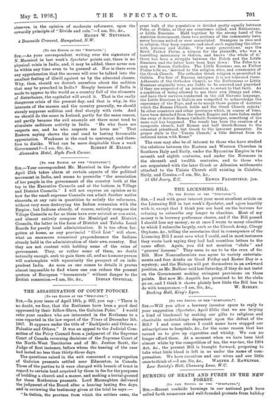THE ASSASSINATION OF COUNT POTOCKI.
[TO THE EDITOR OF THE " SPECT ATOR." J
SIR,—In your issue of April 18th, p. 602, you say : "There is no doubt, we fear, that the Ruthenes have been a good deal oppressed by their fellow-Slays, the Galician Poles." I would refer your readers -who are interested in the Ruthenes to a case reported in the law report of the Times of December 5th, 1907. It appears under the title of " Zackljnski and Others v. Polushie and Others." It was an appeal to the Judicial Com- mittee of the Privy Council from a judgment of the Supreme Court of Canada reversing decisions of the Supreme Court of the North-West Territories and of Mr. Justice Scott, the Judge of first instance, before whom the hearing of the case bad lasted no less than thirty-three days.
The questions raised in the suit concerned a congregation of Galician peasants settled near Edmonton, in Canada. Three of the parties to it were charged with breach of trust in regard to certain land acquired by them in fee for the purposes of building a church and a manse, and making a burial-ground for these Ruthenian peasants. Lord Macnaghten delivered the judgment of the Board after a hearing lasting five days, and in reviewing the testimony given at the trial he says :— "In Galicia, the province from which the settlers came, the
great bulk of the population is divided pretty equally between Poles, or Polaks, as they are sometimes called, and Ruthenians, or Little • Russians. Held together by the strong hand of the Austrian Government, these two sections of the community have never become united or ever assimilated. Strangers in race and in religion. they keep separate and aloof, each regarding the other with jealousy and dislike. For many generations, says the Revd. Father Phila.% a witness for the plaintiffs, who was a travelling missionary in Galicia, and knows 'the whole of it,' there has been a struggle between the Polish and the Little Russians, and the latter have been kept down ! The Poles to a man are Roman Catholics. The Little Russians are, as Father Philas tells us, devoted to the religion, rites, and ceremonies of the Greek Church. The orthodox Greek religion is proscribed in Galicia. For fear of Russian intrigues it is not tolerated there. Adherents of the Orthodox Church, as the Ruthenians or Little Russians originally were, are liable to be arrested and punished if they are suspected of an intention to revert to that faith. As a condition of being allowed to use their own liturgy and rites, and have their services conducted in the old Slavonic language, the Little Russians in Galicia are compelled to acknowledge the supremacy of the Pope, and so to accept those points of doctrine which the Roman Church holds and the Greek Church rejects.' In other countries and other provinces which, in course of time, have been detached from the Greek Empire and have fallen under the sway of devout Roman Catholic Sovereigns, something of the same sort has happened. The result has been the creation of a composite church, half Roman and half Greek-Roman to the educated priesthood, but Greek to the ignorant peasantry. Its proper style is the Uniate Church,' a title derived from its enforced union with Rome."
The case may also be of interest to those who have studied the relations between the Eastern and Western Churches in Southern Italy and Sicily, under the Byzantine Empire in the seventh and eighth centuries, and under the Normans in the eleventh and twelfth centuries, and to those who are acquainted with the later Greek or Albanian settlements attached to the Uniate Church still existing in Calabria, Sicily, and Corsica.—I am, Sir, &c.,








































 Previous page
Previous page